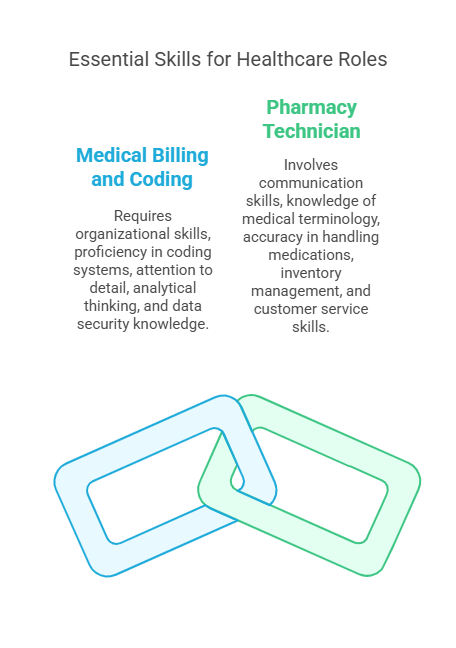Medical Billing and Coding vs Pharmacy Technician: Which Career Suits You Best?
Choosing between a career in medical billing and coding vs pharmacy technician is a common dilemma for those entering the healthcare industry. While both roles are essential in medical services, their responsibilities, training requirements, and work environments vary greatly.
Medical billing and coding professionals handle patient records, insurance claims, and coding—often after earning a medical billing and coding certification from a recognized institution like AMBCI. Meanwhile, pharmacy technicians assist pharmacists in preparing and dispensing medications. This guide will help you understand both career paths and decide which one aligns best with your skills and goals.
Key Takeaways for 2025
Medical Billing and Coding professionals focus on administrative healthcare tasks such as billing, coding, and record management.
Pharmacy Technicians handle medication preparation, dispensing, and inventory management.
Medical Billing and Coding offers remote work flexibility, while Pharmacy Technicians work in active, on-site environments.
Both careers offer solid job prospects but cater to different interests — administrative vs patient-interactive roles.
Medical Billing and Coding: Role & Responsibilities
Medical billing and coding experts are vital for processing patient billing and insurance claims. They use coding systems like ICD-10-CM, CPT, and HCPCS Level II to document healthcare services for reimbursement. They ensure accurate record-keeping, handle confidential data, and follow HIPAA regulations.
Coding errors can result in severe financial and legal consequences, making attention to detail crucial in this field.
Pharmacy Technician: Role & Responsibilities
Pharmacy Technicians support pharmacists by preparing medications, managing inventories, and processing insurance claims. They are involved in compounding medications and ensuring prescriptions are accurate.
In 2025, the rise of personalized medicine and telepharmacy has increased the demand for skilled pharmacy technicians in both retail and hospital settings.
Education & Training Requirements
Medical Billing and Coding
Certificate or Associate Degree (1-3 years)
Certification: CPC (Certified Professional Coder) or CCA (Certified Coding Associate)
Requires proficiency in medical coding systems
Pharmacy Technician
Certificate/Diploma from vocational school or community college
Certification: PTCE (Pharmacy Technician Certification Exam)
Includes hands-on clinical training
Work Environment Comparison
Salary & Job Outlook in 2025
Medical Billing and Coding
Average Salary (2025): $50,500/year
Job Growth: 8% increase from 2021-2031 (Source: BLS)
Pharmacy Technician
Average Salary (2025): $38,500/year
Job Growth: 6% increase from 2021-2031 (Source: BLS)
Both professions are seeing steady growth due to the increasing demand for healthcare services and digital record management.
Skills Needed for Success
Medical Billing and Coding
Strong organizational skills
Proficiency in coding systems
Attention to detail
Analytical thinking
Data security knowledge
Pharmacy Technician
Communication skills
Medical terminology knowledge
Accuracy in handling medications
Inventory management
Customer service skills
Career Advancement Opportunities
Medical Billing and Coding professionals can move into compliance, auditing, or healthcare management roles. Pharmacy Technicians can specialize in compounding, hospital pharmacy roles, or pursue further education to become pharmacists.
Pros and Cons
Choosing the Right Career Path in 2025
Evaluate your personal strengths and preferences before choosing. If you enjoy data management, quiet work settings, and remote flexibility — Medical Billing and Coding is ideal. If you prefer direct patient interaction and a fast-paced environment — Pharmacy Technician might be the better fit.
6 Lesser-Known Facts for 2025 (with Sources)
Telepharmacy is creating remote pharmacy technician roles in rural areas.
SourceAI tools are assisting medical coders to reduce errors and speed up billing processes.
SourcPharmacy technicians may now administer vaccines in several U.S. states.
SourceMedical billing errors cost the U.S. healthcare system over $250 billion annually.
Blockchain is being explored for secure patient data management in medical billing.
Pharmacogenomics (genetic testing for medication response) is reshaping pharmacy roles.
Source
Frequently Asked Questions (FAQs)
-
They manage patient billing, process insurance claims, and convert healthcare services into standardized medical codes.
-
A diploma or certification from a vocational school or community college, along with hands-on clinical training, is required.
-
The average salary is approximately $50,500 per year, depending on location, experience, and certifications.
-
Yes, remote work opportunities are widely available in this profession, especially after 2020’s digital shift.
-
They can specialize in compounding, work in hospital settings, or pursue further education to become pharmacists.






